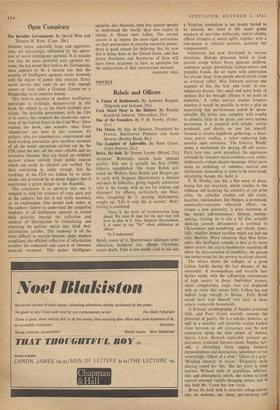Open Conspiracy
The Invisible Government. By David Wise and Thomas B. Ross. (Cape, 30s.) MODERN states, especially large and aggressive ones, are increasingly influenced by the opera- tion of secret intelligence agencies. It is equally true that the more powerful such agencies be- come, the less secret they tend to be. Fortunately, there appears to be a natural law that the security of intelligence agencies varies inversely with the degree of power they exercise. Every secret service that casts its net wide enough sooner or later takes a Graham Greene or a Muggeridge to its sensitive bosom.
This built-in paradox of modern intelligence operations is strikingly demonstrated in this book. Its subject is, as the blurb foolishly pro- claims, 'the invisible government, with the CIA at its centre, that conducts the clandestine opera- tions of the United States in the Cold War.' After reading the book, one wonders what force 'clandestine' can have in this sentence. Its authors, who are conscientious, experienced and hard-working journalists, give excellent accounts of all the major operations carried out by the CIA since the war, all the more reliable and in- formative because they are based on evidence derived almost entirely from public sources which can easily be checked and verified. Yet their conclusion is, oddly enough, that the workings of the CIA are hidden by so many cloaks and protected by so many daggers that it constituted a grave danger to the Republic.
The conclusion is so perverse that one is tempted to look for evidence of some parti pris in the authors; but this is not really necessary as an explanation. One should look rather at the authors' failure to understand the congenital tendency of all intelligence agencies to extend their activities beyond the collection and analysis of information to formulating and executing the policies which they think their information justifies. This tendency is all the more difficult to restrain because, under modern conditions, the efficient collection of information involves the command and control of immense material resources. This makes intelligence
agencies, like Marxists, even less content merely to understand the world; they also aspire to change it. Hence their follies. The correct answer is to impose the most rigid restrictions on their pretensions to exercise executive power; there is good reason for believing that by now this is being done in the United States, and that future Presidents and Secretaries of State will have fewer occasions to have to apologise for the indiscretions of their over-zealous servants.
GORONWY REES






































 Previous page
Previous page